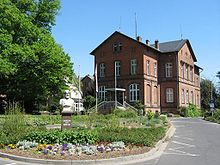 Building of the Geisenheim Grape Breeding Institute Building of the Geisenheim Grape Breeding Institute | |
| Location | 49°59′03″N 7°57′41″E / 49.98417°N 7.96139°E / 49.98417; 7.96139 |
|---|---|
| Map | |
 | |
The Geisenheim Grape Breeding Institute was founded in 1872 and is located in the town of Geisenheim, in Germany's Rheingau region. In 1876 Swiss-born professor Hermann Müller joined the institute, where he developed his namesake grape variety Müller-Thurgau, which became Germany's most-planted grape variety in the 1970s. Professor Helmut Becker worked at the institute from 1964 until his death in 1989.
Academic Grade
Geisenheim is the only German institution to award higher academic degrees in winemaking. Formally, undergraduate level viticulture and enology, ending with a bachelor's degree in engineering is awarded by the University of Applied Sciences in Wiesbaden, and the newly introduced master's degree is awarded by the Giessen University.
Breeds
- White: Müller-Thurgau, Arnsburger, Ehrenfelser, Saphira, Reichensteiner, Ehrenbreitsteiner, Prinzipal, Osteiner, Witberger, Schönburger, Primera, Rabaner, Hibernal
- Red: Rotberger, Dakapo
- Improvements: Rondo, Orléans, Dunkelfelder
See also
References
- Robinson, Jancis (Ed.) The Oxford Companion to Wine. Oxford: Oxford University Press, second edition, 1999.
External links
- DEPARTMENT OF GRAPEVINE BREEDING at Geisenheim University